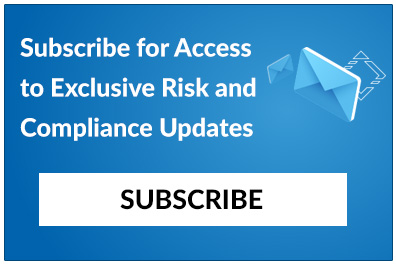Home/ Blog / FinTech Compliance: Biggest Compliance Issues and Steps to Follow AML Regulations
Consumers today seek accessible and easy-to-use solutions for their daily transactions and look for solutions that can make their life comfortable. We have seen and adopted FinTech solutions as an alternative to traditional banking, insurance, and financial investments.
As of 2019-2022, the FinTech market has been valued at over $187B with interest and investment opportunities; the industry is rising. With such expansion comes regulatory needs, which can become a daunting task since new rules pop up every year.
About FinTech Compliance
FinTech compliance refers to the obligations of associated companies to follow the rules and regulations laid out by the governing bodies. These include data privacy, customer security, and financial technologies. The ultimate purpose of these laws is to protect the consumers and investors within the financial services sector.
FinTech regulations may vary from state to state and under different jurisdictions. Hence, different regions have regulatory bodies that enforce the laws for FinTech solution providers and their banking and credit union partners. These laws protect customers, and various bodies take responsibility for specific areas of the laws regulated.

Common FinTech Regulations in the US
| Regulators | Objectives |
| Financial Crimes Enforcement Network (FinCen) | Collects and analyzes data about financial transactions to counter various financial crimes such as money laundering or terrorist funding |
| Financial Industry Regulatory Authority (FINRA) | It is a private corporation that self-regulates the financial industry, member brokerages, and exchange markets |
| Federal Trade Commission (FTC) | US government agency responsible for protecting consumer privacy by enforcing civil antitrust and protection laws |
| Consumer Financial Protection Bureau (CFPB) | Government agency that protects the financial industry. They oversee banks, credit unions, lenders, security firms, and other organizations |
| US Securities and Exchange Commission (SEC) | Government agency responsible for regulating and enforcing laws against manipulation of exchanges |
| Commodity Futures Trading Commission (CFTC) | Government agency responsible for regulating the financial market that includes futures, swaps, and other options |
| Office of the Controller of Currency (OCC) | The Independent bureau set by the US Treasury Department charters and regulates national banks and other financial institutions along with foreign banks operating in the US |
| National Credit Union Administration (NCUA) | A government-supported agency that insures credit unions and provides deposit insurance to regulate federal credit unions |
| Federal Deposit Insurance Corporation (FDIC) | A government supported organization that supplies deposit insurance to depositors in American depository institutions |
| State Legislators | Every state has unique regulations that apply only to the operations in that state. FinTech companies must remain aware of the state of operation and all the risk and compliance regulations that they need to follow |
Biggest FinTech Compliance Issues with Simple Solutions
FinTech is complex and tough to navigate the industry with an even trickier execution. Much can go wrong with the high stakes and the pressure. So, it is wise that companies understand the challenges and prepare themselves for any shortcomings.
Breaches in Data Security
The most focused practice for FinTech companies is to remain vigilant about consumer protection and data security. Vulnerabilities in a program pose risks to users and need immediate attention. Failure to adhere to any issues can lead to data breaches that cost financial and reputation loss.
Solution: Provide a streamlined onboarding plan to keep the platform free of fraudulent activities. Always have a reporting option for any malicious activities. This action helps minimize vulnerabilities and ensures mitigation of criminal activities.
Costly Regulatory Compliance
Having lots of variables and factors, regulatory compliance is a costly process. However, it is also necessary as it updates according to dynamic regulations, evolving fraud schemes, and other activities. It is also a supportive solution to counter fraud and money laundering, transaction monitoring, and managing identified cases. All the processes take considerable time and cost, whether manually operated or automated.
Solution: Staying appraised with updated regulatory practices and new fraud schemes can keep the cost to a minimum. Ensure that the risk and compliance software remain updated to keep the changing environment under scrutiny. Hiring an expert in the area is also a good idea to control costs.
Failure to Apply Risk and Compliance Management at Development Stage
Risk and compliance are necessary for any FinTech platform and should not remain an afterthought during development. Compliance plays a huge role in setting customer interactions, data collection, storage, and interface. It is necessary to make it a crucial part of the development cycle at the initial stage.
Solution: Ensure that you keep risk and compliance in mind at the beginning of platform development, and it saves time in the future and avoids any last-minute changes to make the product compliant.
Ensuring Technology Remains at Pace with Regulatory Changes
One of the greatest challenges that FinTech faces is to keep up with the changing technological innovations and regulatory environment. With new methods of fraud emerging, it is important to keep the team aware of these issues. The change of regulations applies to any platform with workflows to set technology updates to account for the regulatory requirement.
Solution: One way is to hire an expert in risk and compliance to stay ahead of regulatory changes. Alternatively, the best in-house risk and compliance solutions can stay on top of changes and update them accordingly.
FinTech market offers investment opportunities but faces many compliance challenges along the way. Share on XFollowing AML Compliance Regulations
Hiring a Compliance Expert
Achieving adequate compliance is complex and not easy, but extremely important. An AML compliance officer can give legal advice to ensure that the company is aware of all the regulations and requirements to follow.
These professionals help navigate the complexities to develop a program that ensures the FinTech platform and customers remain safe from malicious acts.
AML Regulation Considerations
It is important to clearly understand AML compliance regulations that apply to an organization before starting. Owners must consider addressing these regulations and self-regulate accordingly to requirements critically.
With the right system implemented, a company can follow the best practices of rules and regulations and remain compliant.
Developing a Scalable AML Program
Implementing a robust AML compliance program gives FinTech operations an edge while adhering to all risk and compliance matters. It ensures the correct data collection and performs all checks, including onboarding and afterward. An AML program not only keeps operations smooth but also protects against any malicious practices.
Onboarding Customers with Adequate KYC
Know Your Customer or KYC is essential to ensure customer information before onboarding. It adheres to compliance rules and helps companies sort the best potential client. By performing rigid checks during account creation, companies reduce the chances of criminals trying to gain access to the platform. It allows managing clientele with safe accounts.
Use Suspicious Activity Monitoring
Maintaining and adhering to compliance regulations requires consistent work. Having strict monitoring and reporting on suspicious activities allows mitigation of fraudulent activities. With proper thresholds set up, companies can keep track of malicious activities and increase revenue while keeping users safe.
Automating Management
Implementing automated risk and compliance software saves time, effort, and money while reducing human errors without missing a deadline.
Following Updated Regulations
Financial laws and regulations tend to change regularly and unexpectedly. Keeping up with updated regulations keeps a company aligned with all the regulations and up to date with the changing environment.
About the Company
360factors, Inc. (Austin, TX) helps companies improve business performance by reducing risk and ensuring compliance with effective Business Intelligence (BI) solutions. Predict360 is a flagship software product that integrates regulations and requirements, policies and procedures management, risks and controls, audit management, and inspections with online training and qualifications in a single cloud-based platform based on artificial intelligence. Remain up to date on industry news/updates through our LinkedIn, Facebook, and Twitter pages.
Request a Demo
Complete the form below and our business team will be in touch to schedule a product demo.
By clicking ‘SUBMIT’ you agree to our Privacy Policy.




